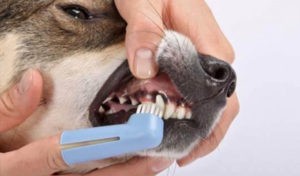 Many things can cause a cat to become constipated: an intestinal blockage, stress, not enough exercise, not enough water, arthritis, a tumor, or something else entirely. Symptoms include straining to defecate, tiny or hard feces, and sometimes not defecating for days. A mild case of constipation can be treated by adding fiber to the cat’s diet or by giving him a laxative. Severe cases can require a procedure to remove the impacted feces. And in extreme situations, if the colon’s nerves have been damaged by prolonged impaction, surgery may be recommended to remove the damaged section of colon.
Many things can cause a cat to become constipated: an intestinal blockage, stress, not enough exercise, not enough water, arthritis, a tumor, or something else entirely. Symptoms include straining to defecate, tiny or hard feces, and sometimes not defecating for days. A mild case of constipation can be treated by adding fiber to the cat’s diet or by giving him a laxative. Severe cases can require a procedure to remove the impacted feces. And in extreme situations, if the colon’s nerves have been damaged by prolonged impaction, surgery may be recommended to remove the damaged section of colon.
Overview
Constipation may sound like an innocuous enough problem, but for some cats constipation can lead to disease processes that can even be life ending.
Constipation is a condition in which cats pass feces less often or in smaller amounts than normal. Feces are often hard and dry, which may cause cats to strain or have difficulty passing feces. While constipation may occur periodically, obstipation is a more persistent and severe form of constipation, in which defecation is impossible or nearly impossible.
The cause of constipation and obstipation (the severe, end-stage form of this disease process) is believed to be multifactorial. Some of the potential causes include:
Blockages from hairballs or other foreign materials
Reluctance to use the litterbox because of stress, a change in litter, a full/dirty box, or painful urination
Lack of exercise
Decreased water intake
Dehydration, often caused by kidney disease
Nerve damage
Arthritis, making it painful to squat
Tumors
Some drugs, including anesthetics
Trauma
In some cats, a condition called megacolon contributes to constipation and obstipation. Megacolon is characterized by a decreased ability of the colon to move fecal material through in the normal way. Fecal material accumulates in the colon, resulting in constipation. Researchers believe that megacolon is caused by a problem with contraction of the muscles in the colon. It has also been suggested that severe prolonged retention of feces (as with constipation or obstipation) can stretch and damage the muscles of the colon, causing megacolon to develop. However, the cause of megacolon is undetermined in most cases.
Symptoms and Identification
Cats with constipation or obstipation may exhibit the following signs:
Infrequent or no defecation
Straining to defecate
Hard, dry feces
Defecating outside the litterbox
Small quantities of feces
Small amount of liquid stool with mucus or blood
Vomiting
Lack of appetite
Depression
Male cats with a blocked urinary tract may also strain in the litterbox. Owners may mistake this for constipation, which is a problem since a blocked urinary tract is a medical emergency. If your cat is straining in the litterbox and there is no evidence of urine or only a small amount of urine, contact your veterinarian immediately!
Veterinarians may be able to palpate (feel) the abdomen to detect firm feces in the intestines. In overweight cats, however, abdominal fat can limit a veterinarian’s ability to feel fecal material in the intestines. In these cases, a radiograph (X-ray) may be necessary to assess the problem. In the case of obstipation or megacolon, the colon will be greatly stretched beyond its normal size.
Occasionally, an endoscopic exam may be necessary. Anesthesia is required for this procedure, which involves inserting a tube containing a small camera into the rectum. This enables the veterinarian to look inside the rectum and colon for abnormalities such as narrowing of the colon or tumors that may prevent feces from passing. A biopsy of the tissue may also help identify other disease processes that are causing/contributing to this process.
Veterinarians will also recommend blood work to look for underlying diseases that may cause dehydration leading to constipation.
Affected Breeds
All breeds of cats are susceptible to developing constipation.
Treatment
Treatment varies depending on the degree of constipation and the amount of discomfort a pet is experiencing. If constipation is mild, veterinarians may supplement a cat’s diet with fiber, such as canned pumpkin, bran, or psyllium. Other medications, such as stool softeners, laxatives, and motility modifiers, may help, as well.
If an underlying condition, such as kidney disease, may be causing dehydration and constipation, treating the problem and rehydrating the cat with fluid therapy can help.
For more severe forms of constipation, enemas may be necessary. Anesthesia for manual removal of feces may be recommended in severe cases.
In cases of megacolon, the diameter of the colon can sometimes be stretched so far that the muscles of the digestive tract are permanently damaged. When this happens, surgical removal of the affected portions of the colon may be necessary. Postoperative complications can include chronic diarrhea, but this procedure is often considered a lifesaver.
Prevention
Because dehydration is frequently involved in constipation, making sure cats have ample access to clean water is essential. Similarly, if a cat has kidney disease or another illness that predisposes to dehydration, additional fluid therapy may be recommended. Cats with arthritis may benefit from joint supplements or pain medication, and cats with a history of constipation may benefit long term from a special diet or supplement that provides additional fiber.
Obstipation and megacolon may be prevented in some cases by very assiduous observation of the cat’s elimination behaviors and medical management of the disease process throughout.




